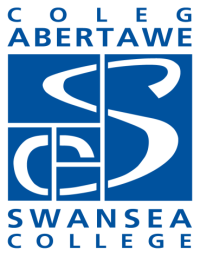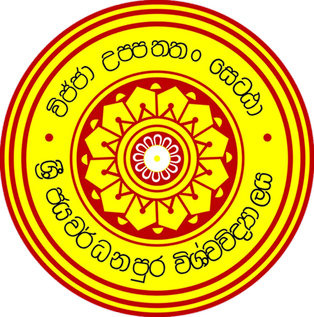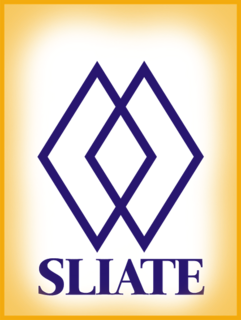
Vocational education is education that prepares people to work as a technician or to take up employment in a skilled craft or trade as a tradesperson or artisan. Vocational education is sometimes referred to as career and technical education.
National Vocational Qualifications (NVQs) were practical work-based awards in England, Wales and Northern Ireland that are achieved through assessment and training. The regulatory framework supporting NVQs was withdrawn in 2015 and replaced by the Regulated Qualifications Framework (RQF), although the term "NVQ" may be used in RQF qualifications if they "are based on recognised occupational standards, work-based and/or simulated work-based assessment and where they confer occupational competence".

"The Open University of Sri Lanka" (OUSL) is a national university in Sri Lanka. It is unique within the Sri Lankan national university system for being the only university to offer programs of study leading to Certificate, Diploma, Degrees and Postgraduate degrees up to PhD level through the Open and Distance Mode of Learning(ODL). The degrees awarded by the university are treated as equivalent to degrees awarded by any other Sri Lankan University under the preview of the University Grants Commission.
A postgraduate diploma is a postgraduate qualification awarded after a university degree, which supplements the original degree and awards them with a graduate diploma. Countries that award postgraduate diplomas include but are not limited to Bangladesh, Barbados, Belgium, Brazil, Canada, Chile, Colombia, Germany, Hong Kong, Jamaica, Spain, Kenya, South Africa, India, Ireland, the Netherlands, New Zealand, Nigeria, Republic of Panama the Philippines, Portugal, Russia, Pakistan, Poland, Saudi Arabia, Singapore, Sweden, the United Kingdom, Sri Lanka, Trinidad and Tobago and Zimbabwe. Level of education and recognition differ per issuing country.

Swansea College was a further education college in Swansea. It was one of the largest further education colleges in Wales with over 15,000 students and employing approximately 1,000 staff. Swansea College merged with Gorseinon College on 20 August 2010 to create a single sixth form and further education college for the Swansea area called Gower College Swansea.

Education in Sri Lanka has a long history that dates back two millennia. While the Constitution of Sri Lanka does not provide free education as a fundamental right, the constitution mentions that 'the complete eradication of illiteracy and the assurance to all persons of the right to universal and equal access to education at all levels" in its section on directive principles of state policy at (27. Sri Lanka's population had an adult literacy rate of 96.3% in 2015, which is above average by world and regional standards. Computer literacy in 2017 28.3% and phone users in 2017 105%, website users 32% in 2017. Education plays a major part in the life and culture of the country. which dates back to 543 BC. Sri Lanka's modern educational system modeled after Christian missionary system was brought about by its integration into the British Empire in the 19th century. Education currently falls under the control of both the Central Government and the Provincial Councils, with some responsibilities lying with the Central Government and the Provincial Council having autonomy for others. Education institutions with a tradition dating back to 5 BC are largely ignored by the state.

The University of Sri Jayewardenepura is a university in Sri Lanka. It is in Gangodawila, Nugegoda, near Sri Jayewardenepura Kotte, the capital city. It was formed in 1958 out of the Vidyodaya Pirivena, a Buddhist educational centre which was founded in 1873 by Ven. Hikkaduwe Sri Sumangala Thera.

St Wilfrid's Catholic High School is a mixed secondary school and sixth form with academy status located in Featherstone, West Yorkshire, England. It also has dual Language and Vocational specialisms.

Selby College is a tertiary college, offering A Level courses through its Sixth Form Academy, work-related vocational courses, apprenticeships, business training and adult education courses. It is located in Selby, North Yorkshire, England. The College is a provider of A levels and vocational education for sixteen to eighteen year olds. Selby provides apprenticeships, higher education including foundation degrees, honours degrees and HND/HNC level qualifications as well as workforce training.

The Theological College of Lanka (TCL) is a college that was inaugurated in 1963 by the Anglican Church, the Methodist Church and the Baptist Church in Sri Lanka. Later the Presbyterian Church joined the federation, to educate the new clergy (ministers) and laity in the environment and context of Sri Lanka and their own languages, Sinhala and Tamil. Rev. Basil Jackson, a British Methodist Missionary, became the founding Principal of the college in 1963.. It is believed that language is the vehicle of culture and when Christians begin to think, speak, preach, pray and write in their own languages, they soon become familiar with their cultural values and begin to appreciate them in the practice of their Christian faith. This new step was foreseen by all the churches as an attempt to produce indigenous theology by people who are being educated in Sri Lanka.
Aitken Spence PLC is a Sri Lankan blue chip conglomerate with operations in South Asia, the Middle East, Africa and the Pacific. Listed in the Colombo Stock Exchange since 1983, it has major interests in hotels, travel, maritime services and logistics. The group also has a significant presence in printing, plantations, power generation, financial services, IT, Business Process Outsourcing/Knowledge Process Outsourcing sector, elevator agency services, garments, and property development.
Higher education in Sri Lanka is an optional final stage of formal learning following secondary education. Higher education, also referred to as tertiary education occurs most commonly universities or degree-granting institutions. These may be public universities, public and private degree-granting institutions which award their own degrees or degrees from foreign universities. High visibility issues include limited capacity of public universities to cater for the demand and opposition to private universities from certain segments.
EDEX is a multi-stakeholder initiative promoted by the Royal College Union, the alumni association of Royal College Colombo, Sri Lanka. Launched as the annual social responsibility project of Royal College Union with the vision To empower Sri Lankan youth to be globally competitive; EDEX has emerged from being an education and careers exhibition to a multi disciplinary voluntary service organisation that serves the nation with many value additions, including EDEX Expo, EDEX Careers, EDEX Magazine, EDEX Think Green, EDEX Sithuwam and EDEX Live Your Dream.

The Sri Lanka Institute of Advanced Technological Education is a statutory body in Sri Lanka coming under the purview of the Higher Education Ministry and offering Higher National Diploma courses. At present, it manages and supervises eighteen provincial Advanced Technological Institutes throughout the island. The Institute is traditionally known for its education in the accountancy and engineering. As per the recommendations of the Committee appointed by Prof. Wiswa Waranapala, Deputy Minister of Higher Education in 1994, the Sri Lanka Institute of Advanced Technical Education (SLIATE) was formed in 1995, under the Sri Lanka Institute of Advanced Technical Education Act No. 29 of 1995. In 2001 the name of the institution was amended as Sri Lanka Institute of Advanced Technological Education (SLIATE).
Christian Eisenberger is an Austrian artist.

The University of Vocational Technology (UoVT) Sinhala: වෘත්තීය තාක්ෂණ විශ්වවිද්යාලය, Tamil: இலங்கை வாழ்க்கைதொழில் தொழிநுட்பவியல் பல்கலைக்கழகம் is established by the parliamentary Act No. 31 of 2008, in 2009 and functions under the purview of the Ministry of Higher Education, Innovation and Technology. The general objective of the University of Vocational Technology is to provide progressive upward movement to the students in the Engineering Technology Education and Industrial Training System, based on their aptitudes and abilities, to acquire university education.
TVET in Sri Lanka refers to the development and implementation of Technical and Vocational Education and Training (TVET) in the Sri Lankan education system and labor market. In Sri Lanka, the formal TVET sector comprises about 635 public sector training centres and 718 private and NGO training centres. A large number of non-formal TVET providers also provide training in IT on a fee-for-service basis, and there is a widespread network of non-fee-levying institutions that are funded by various national and international charities. These providers educate people of all ages — from secondary school leavers to working adults, parents and others who have suspended their education for various reasons and need training or retraining.
Post-secondary qualifications are qualifications typically studied for after successful completion of secondary school. In Sri Lanka, this is usually after successful completion of the General Certificate of Education. A variety of different post-secondary qualifications are offered in Sri Lanka.
Ocean University of Sri Lanka was established in 2014 by an act passed by the Parliament of Sri Lanka. It was earlier called the National Institute of Fisheries and Nautical Engineering. The objective of the university is to conduct academic and professional education and vocational training activities in fisheries, marine and nautical engineering to fulfill and develop the needs of the fisheries and allied sector in Sri Lanka.


















